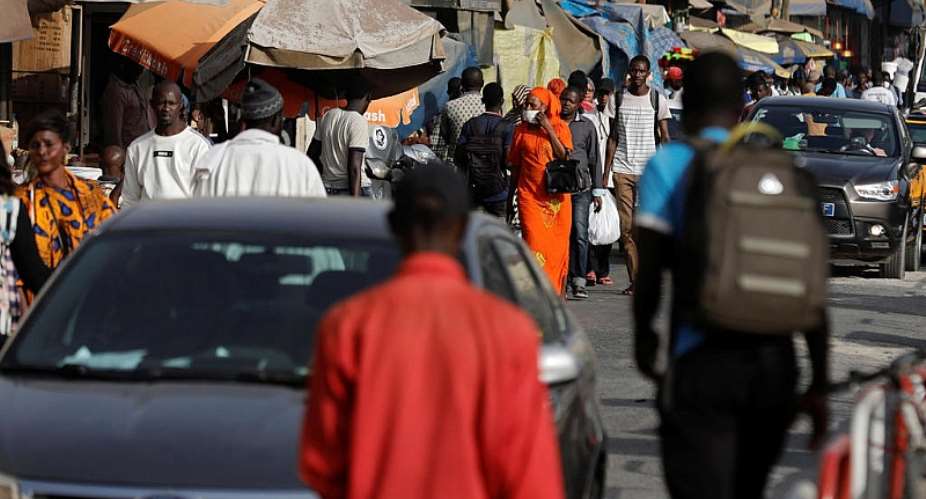As African nations race to impose lockdowns and curfews in a bid to limit the spread of Covid-19, some are worried about the disruption that social distancing will bring to Africa's social norms.
On a continent where two or three generations often live under the same roof, and personal space is lacking, some experts believe it will be more difficult to impose social distancing to slow down the coronavirus spread in Africa compared to Europe, Asia and the United States.
"Spending time together is the norm," says Gilles Yabi, founder of the West African think tank Wathi, of a culture where family gatherings and big crowds go hand in hand.
That continues even in sickness. In African cultures, the sick are treated and revered, not isolated, making self-quarantining almost impossible.
Socialisation is not just a matter of culture but survival. "People need to work," continues Yabi, "and that involves taking public transport and mingling with other passengers in oft-packed buses."
Crowded cities and vast slums also complicate social distancing in Africa.
"For a variety of reasons, it is certainly very difficult to enforce," he told RFI.
Yet, confinement has become inevitable, as the number of coronavirus cases climbs, forcing African governments to impose restrictions on their citizens to curb the outbreak.
In God we trust
According to Yabi, getting people to listen to the restrictions will depend on the credibility of the one dishing out the instructions.
Trust in government remains low but is high among religious leaders. Yabi says policy makers should include religious authorities in their lockdown measures to bring populations on board.
Authorities are struggling to do that in Africa's largest country Nigeria, where certain pastors have launched disinformation campaigns challenging the existence of the coronavirus.
"A lot of people think it is only God who chooses who will die or who will be contaminated. It is difficult to get them to realise that human beings have the capacity and the intelligence to make decisions themselves," explains Yabi.
The Nigerian government has urged citizens to rely only on information related to Covid-19 that has been approved by the Nigeria Centre for Disease Control.
Several African countries have implemented lockdowns and curfews, encouraging citizens to stay at home and self-isolate. Confinement offers more security on a continent where health systems are weak.
Investing in health
"I think the continent has the possibility of limiting the spread of the coronavirus, but if countries miss that opportunity, I don't see how the continent can cope," comments Yabi.
For years, doctors have complained that underfunding and neglect have debilitated health systems.This makes Africa's handling of the pandemic much more challenging.
"If even a small percentage of the population catches the dangerous form of the disease it will be impossible to give them urgent assistance," says the Wathi founder, whose think tank recently published a paper on West Africa's health systems.
A poor country like Bangladesh has 5 medical doctors per 10,000 people, whereas Cote d'Ivoire has 2.3 doctors and Burkina Faso--hardest hit in West Africa by Covid-19-- has just 0.6 medical practitioners per 10,000 people, explains Yabi.
"This is why you can't manage this epidemic in our countries," he says, calling for more investment in terms of staff and resources to bolster African systems, and help them cope with the curtailing the transmission of the coronavirus.





 Akufo-Addo spotted ordering chiefs to stand for his handshake
Akufo-Addo spotted ordering chiefs to stand for his handshake
 Akufo-Addo ‘disrespects’ every chief in Ghana except Okyenhene — NDC Communicato...
Akufo-Addo ‘disrespects’ every chief in Ghana except Okyenhene — NDC Communicato...
 Supreme Court clears way for dual citizens to hold key public positions
Supreme Court clears way for dual citizens to hold key public positions
 Be transparent, don’t suppress the truth – Prof. Opoku-Agyemang to Jean Mensa
Be transparent, don’t suppress the truth – Prof. Opoku-Agyemang to Jean Mensa
 ‘I won’t tell the world I was only a driver’s mate during challenges’ – Prof Jan...
‘I won’t tell the world I was only a driver’s mate during challenges’ – Prof Jan...
 We’ll prosecute corrupt officials of Akufo-Addo’s govt – Prof Jane Naana
We’ll prosecute corrupt officials of Akufo-Addo’s govt – Prof Jane Naana
 [Full text] Acceptance speech by Prof Jane Naana Opoku-Agyemang as 2024 NDC Runn...
[Full text] Acceptance speech by Prof Jane Naana Opoku-Agyemang as 2024 NDC Runn...
 Election 2024: Don’t be complacent, we haven’t won yet – Asiedu Nketia cautions ...
Election 2024: Don’t be complacent, we haven’t won yet – Asiedu Nketia cautions ...
 Election 2024: Stop fighting over positions in Mahama’s next govt – Asiedu Nketi...
Election 2024: Stop fighting over positions in Mahama’s next govt – Asiedu Nketi...
 Prof Jane Naana Opoku-Agyemang will restore dignity of vice presidency – Fifi Kw...
Prof Jane Naana Opoku-Agyemang will restore dignity of vice presidency – Fifi Kw...
